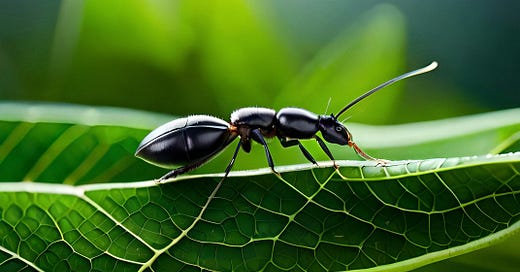Narrative Change Newsletter // March-April 2025
Our bi-monthly summary of research, ideas and insights about changing the narrative for animal freedom...
— Content we love —
Why do the public love stories about animal resistance?
When Animals Escape is a brilliant article from The Empathy Project that explores what a powerful narrative ‘animal resistance’ is, showing how our animal cousins have agency, desire their freedom and resist their oppression. ‘Animal resistance’ is part of the bigger narrative ‘animal abilities’, which is the most persuasive narrative Animal Think Tank has found so far at increasing people’s empathy and support for animal causes.
Did you know that ants play like puppies?
As ethologist Marc Bekoff explains: “Happiness is never better exhibited than by young animals, such as puppies, kittens, lambs, etc., when playing together, like our own children. Even insects play together, as has been described by that excellent observer, P. Huber, who saw ants chasing and pretending to bite each other, like so many puppies.” Again, showing how other animals play reinforces both an ‘animal abilities’ narrative and ‘a bigger us’ narrative (which highlights the similarities humans and other animals share and how we are all part of a bigger community).
How can we reduce speciesism?
This 2025 study tested interventions to expand humans’ moral circle to include other animals. It used a multi-step intervention to reduce speciesism, combining awareness of one’s bias, informational videos, and perspective-taking exercises. Importantly, they found that the perspective-taking component – having participants imagine themselves in the place of another animal – was key to success. When people practiced empathising with other animals, speciesist attitudes and even ‘meat’ consumption dropped significantly. Simply providing facts or even telling participants about their bias was not enough; engaging emotion and empathy was most effective at reducing speciesism.
— Animal Think Tank’s communication guides —
Last month, we released our Communications Toolkit, which summarises key strategies for persuasive communications. You can access it for free here.
We’ve also just released the first edition in our Mini Guide series, which dive deeper into different aspects of persuasive communications. This first Mini Guide explores how we can better understand our audiences and tailor our communications to resonate with them. You can access the guide for free here. In May, we’ll be releasing the next Mini Guide, focused on narrative change, and in following months we’ll be sharing guides about framing, language, messaging, values and more…
— We’re recruiting a Comms & Marketing Lead —
Animal Think Tank’s work is in the next stage of its journey. We are building a new Communications Hub to support and unify messaging across the UK animal freedom movement. The goal is to enhance the narrative power of the movement.
The Comms & Marketing Lead will elevate our research and content to increase our impact. You can see the full success profile here.
— Animal Think Tank’s latest blogs —
What can we learn from Big Animal Ag's narrative strategy?
One of our movement’s biggest challenges is overshadowing the harmful narratives pushed by industries that profit from exploiting animals—narratives designed to make the public believe this is natural, normal, necessary, even nice.













